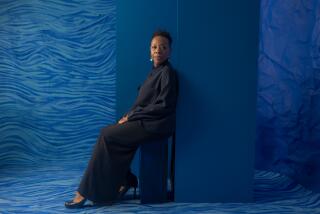They Stirred Things Upon the Small Screen First
- Share via
Just as such acclaimed directors as Steven Spielberg, Sidney Lumet, George Roy Hill, Michael Mann and John Frankenheimer cut their directing teeth in television, so too did many of England’s best-known filmmakers. A new series at the Museum of Television & Radio, “Disruptive Directors of British Television,” shines the spotlight on the breakthrough TV movies of Ken Russell, Ken Loach, Mike Leigh, Stephen Frears and the late Alan Clarke.
“These directors did remarkable things,” says series curator Ron Simon. “‘Disruptive’ is a great word because they disrupted the whole system of British television. They never really got any type of broadcast run in the United States, but they should be seen and thought about.”
Four of the films in the series--Russell’s “Elgar,” Loach’s “Cathy Come Home,” Clarke’s “Made in Britain” and Leigh’s “Abigail’s Party”--were selected as favorite British programs from the 20th century in a recent poll conducted by the British Film Institute.
Russell, who directed such eclectic and often flamboyant feature films as “Women in Love,” “The Boyfriend,” “Tommy,” “The Music Lovers” and “Mahler,” developed his inventive, extravagant style in the four biographical TV movies featured in the festival: “Elgar,” his 1962 film about Sir Edward Elgar, for which Russell used stock footage, photographs and narration with sequences in which actors play out his life without dialogue; 1966’s “Isadora Duncan: The Biggest Dancer in the World,” starring Vivian Pickles as the free-spirited performer; 1965’s “The Debussy Film: Impressions of the French Composer,” starring Oliver Reed; and 1968’s “Song of Summer,” a haunting adaptation of Eric Fenby’s memoir about a young music student who inspired blind composer Frederick Delius to write again.
Loach, who has investigated the plight of the working class in such features as “Poor Cow” and, most recently, “Bread and Roses,” turned England on its ear in 1966 with “Cathy Come Home,” a semi-documentary-style drama about homelessness in England. Carol White plays a young wife and mother whose life is caught in a downward spiral of poverty.
“‘Cathy Come Home’ is a TV drama that had more impact in Great Britain than any other program,” says Simon. “The way it was shot ... you really think you are watching a documentary. Social realism has always been a hallmark of his style, and this was the very beginning [of his career]. The film is certainly remarkable in the way it uses different elements of film styles.”
Russell, Simon says, “blurred genre lines in a very extravagant way. Loach did it in a very realistic way. It was a great period of experimentation [in the ‘60s and early ‘70s]. There was a great period of freedom, especially at the BBC.”
Leigh, who has directed “Secrets & Lies,” “Naked” and “Topsy-Turvy,” helmed the 1977 dark comedy “Abigail’s Party,” which was based on a stage piece. Leigh’s then-wife and frequent star, Allison Steadman, gives a remarkable performance as an overbearing woman with a henpecked husband who invites her pathetic neighbors over for a party.
“It’s a satirical look at suburban society in Britain,” says Simon. “You can see that his style really works--that whole improvisational style. You are in the ‘70s, and the characters are still trying to find out who they are.”
The ‘80s are represented in the festival by Frears’ “Saigon: Year of the Cat” and Clarke’s “Made in Britain.” Both films aired in 1983.
Like Russell’s and Loach’s, these films demonstrated the different styles of the directors. Frears (“Dangerous Liaisons,” “The Grifters”) is always working closely with the writer, who in this case is David Hare, says Simon. “You see the city of Saigon falling to pieces through the eyes of Judi Dench, who plays an alienated loan officer struggling to find out who she is.”
“Made in Britain” recalls the gritty realism of Loach. In his film debut, Tim Roth plays Trevor, an angry 16-year-old punk skinhead.
“It is not unlike ‘Cathy Come Home,”’ says Simon, “because you are seeing how institutionalized Britain responds to the outsider. Cathy is someone who wanted to be on the inside. Trevor is forever the outsider. You can never get a fix on him and you are wondering what type of England made his character possible.”
*
“Disruptive Directors of British Television” at the Museum of Television & Radio, 465 N. Beverly Drive, Beverly Hills. Screenings begin Thursdays at 6:30 p.m. and Fridays through Sundays at 2:30 p.m. Russell’s movies screen Thursday through Sunday and Nov. 15-18, 23-25; Loach’s “Cathy Come Home” screens Nov. 29-Dec 2, Dec. 6-9; Leigh’s “Abigail’s Party” screens Dec. 13-16, 20-23; Frears’ “Saigon: Year of the Cat” screens Dec. 27-Dec. 30, Jan. 3-6; and Clarke’s “Made in Britain” screens Jan. 10-13, 17-20. Admission is free. Suggested contribution is $6 for adults; $4 for seniors and student; $3 for children under 13 and free for museum members. For information, call (310) 786-1000 or go to https://www.mtr.org.
More to Read
The complete guide to home viewing
Get Screen Gab for everything about the TV shows and streaming movies everyone’s talking about.
You may occasionally receive promotional content from the Los Angeles Times.







